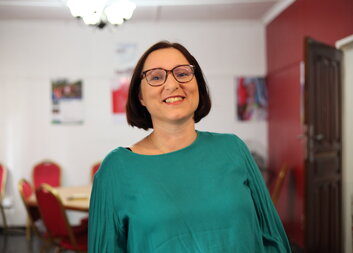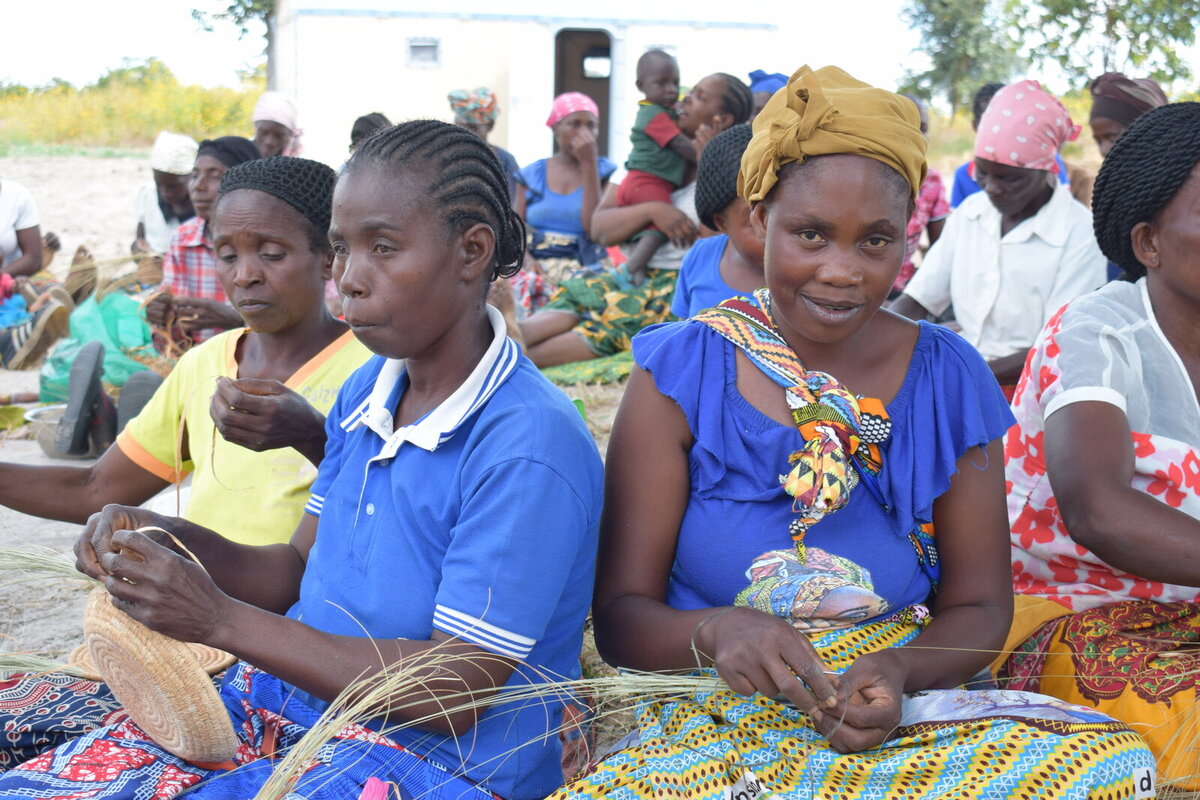Caritas Czech Republic has marked a decade of impactful work in Zambia, celebrating numerous achievements and overcoming significant challenges. In an interview with Martina Havlíkova, the current country director, we discuss the organisation's accomplishments and the obstacles it has encountered along the way.
Can you tell us how long you have worked with Caritas Czech Republic in Zambia and what is your role as the country director?
I come from the Czech Republic and have lived in Zambia since 2010. As the country director of Caritas Czech Republic in Zambia, my role primarily involves overseeing and leading the organisation's operations and initiatives. I am responsible for strategic planning, programme development, and ensuring that our projects align with our mission to alleviate poverty, promote social justice, and empower vulnerable communities. I work closely with our dedicated staff, partners, and volunteers to carry out projects that address the specific needs of the communities we serve. Additionally, I represent Caritas Czech Republic in Zambia by fostering partnerships, liaising with government agencies, and engaging with stakeholders to ensure the success and sustainability of our programs.
Although you were not present at the beginning of Caritas Czech Republic in Zambia, you have been with the organisation for a long time. Could you share with us some insights into the history and work of Caritas Czech Republic in Zambia?
It is true I was not present at the time of the establishment of the organisation’s operations, but I have had the privilege of working with the organisation for many years in various positions. Caritas Czech Republic established its country office in Mongu in Western Province in 2013. The first project focused on improving quality and access to maternal and child healthcare in Western Province. The project was funded by the Czech Development Agency and worked on several levels - strengthening the quality of education at Lewanika School of Midwifery, including support of establishing a registered midwifery course, renovation, and equipping maternity ward at Lewanika General Hospital, working with six rural health centres in Mongu, Limulunga, and Nkeyema, as well as community awareness through Safe Motherhood Action Groups. In 2014, we became UNHCR’s livelihoods partner under the Local Integration of Former Refugees in Mayukwayukwa and Meheba Resettlements. I started working with Caritas Czech Republic as a project coordinator in Mayukwayukwa.
You have been working with the organisation for quite some time now, could you tell us some of the significant achievements and milestones that the organisation has reached in its 10 years of existence in Zambia?
10 years of our work in Zambia is indeed a significant milestone for us. Over the past decade, we have achieved several milestones. We have carried out different types of projects in health, agriculture, livelihoods, and facilitating education and social services to refugees, and it is difficult to put them together. Through various awareness activities, we reached more than 65,000 people on nutrition, and maternal and child healthcare topics, and 45,000 farmers are now adapting to climate change thanks to our initiatives. We trained nearly 14,000 farmers in sustainable farming practices and various value chains and supported them with inputs or cash grants. We also trained over 6,600 various community members in entrepreneurship and financial literacy. 2042 entrepreneurs received cash grants to start or improve their businesses. 312 refugees got into university thanks to Caritas Czech Republic, and 294 young refugees, former refugees, and Zambians completed the Vocational and Entrepreneurship Sponsorship Programme. Over 30,000 members from 1524 saving groups are now actively saving and borrowing money, and many of the groups are using formal financial services. We also supported different infrastructure developments.
What else have you done in the past 10 years of working in Zambia?
Besides the Maternity Ward construction at Lewanika General Hospital, we also constructed a waiting shelter at Nalikwanda Rural Health Center, a bulking centre and library in the Mayukwayukwa refugee settlement, a value addition centre in Meheba, and a vocational training workshop in Mantapala and Meheba, just to name a few. An essential aspect of our livelihood activities is linkages to various financial services, markets, and facilitation of business formalization and product certification.
Collaboration is often crucial to success in humanitarian work. What are some of the partnerships and collaborations that have been instrumental in Caritas Czech Republic's operations in Zambia?
Collaboration has been essential to our success. We work closely with the Zambian government at the national, provincial, and district levels, such as the Ministry of Agriculture and Home Affairs, through the Commissioner for Refugees. We also collaborate with various Zambian institutions, such as the Zambia Development Agency and Zambia Bureau of Standards, financial institutions, universities, and private companies. Our cooperation with UNHCR, the UN Refugee Agency, and the World Food Programme is notable. Finally, the support and involvement of traditional leaders, community leaders, and community volunteers are essential for our work in the Zambian communities. These partnerships have allowed us to reach more communities and implement sustainable solutions. We also work with Czech universities and institutions that provide technical expertise for our projects, complementing the local know-how.
Working on humanitarian and development projects can come with its fair share of challenges. What have been some of the most significant challenges faced by Caritas Czech Republic in Zambia, how have you overcome them and what lessons have you learned with the organisation that has been crucial in improving and expanding its operations?
One challenge includes logistical difficulties in reaching remote areas, especially in Western Province, which has sandy areas that are hard to access. Our field teams require sufficient motorbikes and vehicles to travel to the project communities, and such investment costs can only sometimes be part of the project budgets, not to mention costly maintenance and repair. The COVID-19 pandemic was a completely new challenge. We had to adapt our implementation practices during the pandemic. Still, more importantly, it impacted the already worsening economic situation in Zambia and worsened the fragile livelihoods we supported in the past. However, it also showed that the people we supported with more complex and long-term interventions were more resilient to these shocks. However, these challenges have taught us the importance of adaptability and working closely with the communities we serve to address their unique needs.
How does Caritas Czech Republic plan to ensure the sustainability of its projects and programmes in Zambia for the future?
Sustainability is a crucial focus for us. We are working on capacity-building initiatives within communities to ensure they can continue our projects independently. We work closely with local authorities and the private sector to ensure the programmes continue after we leave. We are also working on new project proposals and looking for new opportunities to ensure we serve our communities. Our strategic programming continues in the same direction of supporting socioeconomic empowerment and sustainable livelihoods. We are mainstreaming environmental and social sustainability into all our livelihood projects, including adaptation to climate change.
Can you give us a sneak peek into any exciting initiatives or upcoming projects?
In June 2023, we started working on a new and first-ever project in the Southern Province where we support small and medium-scale farmers in soya and sunflower value chains, including sustainable farming practices and natural resource management, post-harvest handling, access to markets and finance, and support of Small and Medium Enterprises in transitioning into the green economy. We work with several exciting partners in Zambia, and we appreciate our mutual cooperation.
How does Caritas Czech Republic's work in Zambia fit into the organisation's global aim and initiatives?
Our work in Zambia aligns with Caritas Czech Republic's global aim of alleviating poverty and promoting social justice. While our operations are specific to Zambia, we share a commitment to humanitarian values and principles with Caritas organisations worldwide.
Is there anything else you would like to add about Caritas Czech Republic in Zambia?
I would like to express our heartfelt gratitude to our dedicated staff, local partners, donors, and volunteers who have been instrumental in our success. Without their support and commitment, our work would not have been possible. Special thanks go to the Czech Development Cooperation, which supported many of our projects, and the Czech Embassy in Lusaka, which helps us whenever needed.
To all our supporters, donors, and volunteers, I want to extend a heartfelt 'thank you.' Your contributions have made a real and lasting difference in people's lives in Zambia. We look forward to your continued support as we embark on the next chapter of our journey to create a better future for those in need.
Thank you for the interview











